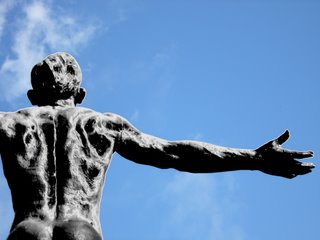
Why are there atheists? Or for that matter, why are there believers? Let’s apply Socrates. (In my meditation, I asked these same questions and was led to further questions that gave some suitable answers.)
Yes, why would a person reject evidence of God’s existence? Why would that person say, for instance, that God does not exist because you cannot prove something that does not exist? But that is getting ahead of our selves. Presented with the proposition that God Whom we cannot see (not necessarily that He does not exist) does exist might be difficult for some people but easy for others? Why?
We think according to how we were taught to think. We make judgments or evaluations according to how we learned to reason out. If we lived in a culture or an environment wherein the emphasis is on science or logic and not on suppositions, naturally we will use these astute methods to draw conclusions. However, if you ever grew up in a family that fed you with superstitions, you will learn to fear the dark and constantly beware of creatures lurking around you. Things you do not see will make you act as if they were real and vicious enough to do damage. On the other hand, those who believe in the benevolent presence of guardian angels feel safe and in ample grace. Some of the most respected people we know bear some weird ideas or taboos that defy objective reason. Efren “Bata” Reyes, for instance, does not take a bath during his billiard tournaments for good luck.
Which makes us wonder: Were we meant to be creatures of accidents or chance or of purpose? If we came out of pure chance, is goodness or excellence something we can choose and enjoy as we please or something we can merely disregard and still live merrily on?
It seems then that how we were brought up or educated has so much to do with the way we perceive ourselves and the world we live in. It further determines our appreciation (or lack of it) of things we refer to as out-of-this-world, things we do not see and hear.
Take this case: Will a blind man believe there is such a thing as a vivid rainbow? Not unless someone told him so. How would you describe colors to such a blind man? How do you tell him that what you see is a mere illusion itself of raindrops playing around with the light to make out a dazzling display of hues? Whatever tools you may use, you might end up convincing the man. You are a valid and direct witness to the reality of a rainbow.
Was the writer of the Genesis account a valid witness of creation, of God and everything he wrote about? If he was, then we can believe his words. We can believe there is a God. We can then go directly to the source of the testimony about God. We bypass those testimonies of our teachers, our parents, of all of human history pointing to the existence of God and His many interventions in our affairs to make our task easier. However, we tend to believe only what we were told or taught to believe. This in itself is an acquired habit but a dangerous one. For with all the evidences available, we can just as well believe primary or first-hand witnesses.
In some cases, of course, people form their beliefs from what they see in nature. The pagans worshipped nature or the Spirit that moves in nature as they saw power at work and beauty displayed. Only a truly blinded person will see creation and not see the Hand behind it. The “savage” may not clearly perceive the nature of Deity but he or she goes through rituals that express that sublime acknowledgment of divine existence. Atheists, on the other hand, do not, as a rule, make as much as a nod to any supernatural being. It is a case of a human spirit denying and rejecting its own existence before and beyond the present. Why so?
“Lack” of evidence does not necessarily mean the “absence” of evidence. Oftentimes, it means the evidence is recognized (obviously, for atheists are mostly intelligent people who have read a lot) but not accepted as valid or real evidence. At most, the proof is taken as “unscientific” or “illogical”. A thing that does not exist cannot be proved. Granted that that is so, let us then apply this statement upon the atheist’s own existence.
We know and accept that the atheist – let’s call him Joe Flash -- exists. We see Joe and hear him and can even touch him. We can converse with him. Does he have a body? Obviously, he does. Does he have a spirit? We think he does. But does he accept that he does? If he does, then good. But does he believe that his spirit will survive his body? If not, then that is one opinion. If he does, then he has destroyed his position as an atheist. For an immortal spirit would mean that it came -- as it really did – from somewhere else, perhaps from God.
Hence, if the human spirit disappears with the body, where did that spirit come from in the first place? From matter? Obviously not, because we were born not of mere matter but of living beings. We are not animals either so we cannot compare ourselves with animals. Besides, the so-called history of evolution is just another form of atheism or at best a theory wearing the convenient clothes of faith. The main point, however, is the question of where human and animal spirits originated. Birds can be trained to talk but not to think. The human spirit has that advantage of sentience. We know because we were meant to know things. Why? Because we are beings with a purpose, not products of chance. The main purpose for plants and animals is to help humans survive. Our main purpose as humans is to find out why we need to survive and why we do survive.
Nevertheless, there are things which, even if we could, we will not know because we do not want to know. A monkey, if it could, would want to know how to make a crunchy pie out of banana or coconut. But humans can make all kinds of recipes out of anything under the leaves of plants and skins of animals. Why? The spirit in us is an image of the One who created us. We see ourselves or we see creation, and we see the reflection of Divinity. To some it is obvious; to others it is not. Why? Because of what we know and how we were taught to know. If atheists only knew what they are capable of knowing, they would believe, too. Alas, for lack of desire, they cannot see the evidences of God’s reality.
In the beginning, Adam and Eve didn’t have to look for evidence. God spoke to them face to face in the Garden. We might exclaim, “Good for them!” But who wrote about Adam and Eve? It was Moses. Did he speak to God? He claimed he did. How do we know he really did? He had tablets of stone to prove that God even wrote the Ten Commandments He gave to the Hebrews. Come on, a guy raised in Egypt where sculpting with metal tools was common could have easily written on stone! Right. What about the light that glowed in his face after he talked to God? People did see him, didn’t they? How sure are we? Well, how sure are we that Hitler commanded the Jews to be gassed? Because somebody saw it and wrote about it. How sure are we that Moses parted the sea? Because somebody saw it and wrote about it.
Where lies the difference? Not in the testimony but in the one who receives the testimony. Testimony is recorded history. Whether written or spoken or seen with our own eyes or heard with our own ears, evidence is always based on human experience or history. Whether direct or not, it will always require belief or faith. If a person is raised to believe in ghosts, he or she will grow to be a ghost-believer. Until such time that he changes his/her mind to believe otherwise.
In the beginning, all people believed in God. At some point in time, people forgot that God exists. Why? Because they forgot (this must be possible) or someone told them there is no God. This statement is most intriguing and deserves our attention.
How do people forget something? When their attention shifts to another thing. I forget to bring my keys because I was busy cleaning my shoes. Or I forget to turn off the light because someone called me on the phone. Can a person forget God? The Pharaohs who came after Joseph’s time forgot that he ever existed or that he saved Egypt from starvation. How was this possible? Did they not erect a memorial for Joseph? Did they not put into their records his deeds? Or if they did, did they pull the memorial down or burned the records? Perhaps, by accident, Joseph was forgotten. Can we accidentally forget God? It is possible. If we try hard enough, we can probably find people who did.
But what about the idea of telling people that there is no God? Is this possible? What would motivate a person do so? If someone else said there is a God. Yes, someone who has forgotten or does not believe in God simply responds to the question: Is there a God? In short, one person is led to atheism as much as another is led to belief. The answer depends on how we think out the conclusion.
In the end, forgetting is a temporary thing. So is believing. Today, one may believe in God and may not after a while. Or one may remain an atheist or a believer until death. In the process, others may be influenced to believe our testimony or not.
This brings us finally to the very root of the history of unbelief. At one time, some Greeks acknowledged an Unknown God. For centuries, the Greeks, without a revealed scripture, concluded that a God exists and honored Him accordingly. The ancient pagans also acknowledged a Divine Presence in nature or adored the many gods of their ancestors. The great liar, Satan, who could not prevent people from believing, sought to confuse the issue by inventing idolatry. When finally he thought of a way to make people not believe in God, he grasped the opportunity, using science and philosophy to make a strong case. With his success at weakening Christianity through greed, divisions and wars, he further strengthened his success at bringing more and more people away from God. Today, some nations legislate against belief in God, against praying in public places and against carrying and reading the Bible. If there is really no God, why the paranoia? Why the repression? Is this an overreaction to the hegemony of the Crusaders or the excesses of modern faith? Or is this merely an expression of the insecurity of atheism?
The greatest lie in the world comes from the greatest liar of all, Satan: There is no God. When Jesus called the Jews “children of Satan”, He was simply calling them liars. Why? Because they did not believe the testimonies of His words and His miracles. Christ came to bear witness to the truth but humans rejected it. Can we now appreciate how powerful unbelief can be? Why? Because this world is ruled by Satan and so the children of God suffer as they did in ancient times. As it is, their testimony of God is overwhelmed by the onslaught of so much unbelief around us. The Book of Revelation had predicted this. Even the early assemblies of Christians came under intense attack from God’s enemies. Faith is under attack and yet it thrives because it has the power to save those who truly seek light and salvation. This spiritual battle may seem subdued or quiet to many but it is a real battle and the intense engagement rages on. Atheism is just one of the many protagonists.
Like it or not, we do not make perfectly independent conclusions in our beliefs. We will always be subjected to the opinions and beliefs of others. Our parents’ upbringing of us, our teachers’ guidance in school and the world’s influence on us will color our thoughts and ideas. And everything else passed on to us may contain the lies invented from the beginning of history when the serpent deceived our first parents. But we can counteract the effects of other people’s stained minds by going directly to the testimonies of those who talked to God or to whom God spoke. This is the only sure way.
Granted that God does not exist in this world or, put in another perspective, if God is beyond human scrutiny; how does one try to prove He exists? Is it really our problem? No! It is God’s problem. To take that as our problem would only make us appear very proud. That’s what atheists do. Instead of assuming something does not exist, why not ask: What if it exists? Isn’t it better to have an open mind and say: Alright, if I were God, what would I do? Will I keep myself hidden from people who think I don’t exist? Will I not do something to try to show them that I do exist? But an atheist may not even care to ask such questions and simply say, “There is nothing to prove for a person who needs no proof.” (Something a believer may also say.) Pride is the greatest obstacle to learning.
Ultimately, unbelief is as much a choice as belief is. Every believer faces a wall when confronted with another person’s unbelief for it is literally and figuratively a dead-end. A deep emptiness besets a believer upon acknowledging that some people do not believe what he believes so earnestly. He even wonders how atheists must feel about people who believe in God. Do atheists feel the same pity or regret? Perhaps. For we take only what we see and act thereon. We feel only what we feel is natural or normal for finite humans to do. Whether we believe or not, we will still be frail creatures on this planet. For now, we all share the same world and experience the same things humans go through in the body. For now, we can only await the final resolution of things.
Why are there atheists? Why are there believers? I don’t think it is because there is no God.

There are no shadows in the sun,
As there is no darkness in heaven;
There are no winds above the clouds
As there is no doubt in a true believer’s heart;
There is no death where there is no sin,
As there is no sorrow in eternal life.
Darkness, doubt and death
Are the fruits of unbelief.
Light, love and everlasting life
Come from belief in God.
(Photo on top: Morning surf in San Juan, La Union. Photo above: Clear day on the beach when sand, sea, sky, sun and soul unite.)
 Because of the El Nino phenomenon, the weather up in the Cordilleras has been milder than usual. It almost seems like the so-called "summer months" -- in reality, the Philippines is one eternal summer place. But up in the mountains, it can get chilly especially from December until February. This year, the absence of frost has yielded an abundant harvest for gardeners. Photo above was taken on Jose Rizal Day, December 30, 2006 at the Baguio City Public Market.
Because of the El Nino phenomenon, the weather up in the Cordilleras has been milder than usual. It almost seems like the so-called "summer months" -- in reality, the Philippines is one eternal summer place. But up in the mountains, it can get chilly especially from December until February. This year, the absence of frost has yielded an abundant harvest for gardeners. Photo above was taken on Jose Rizal Day, December 30, 2006 at the Baguio City Public Market.












